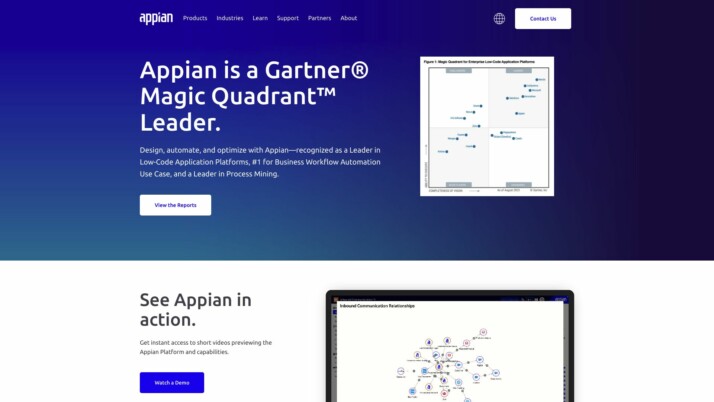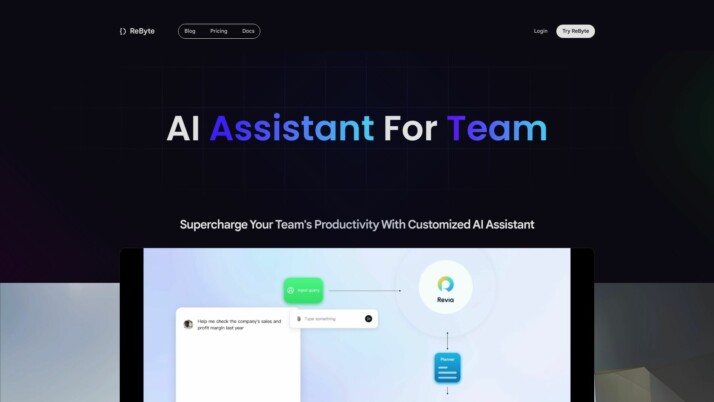Appian vs. Rebyte: AI Development Platforms Compared
AI platforms revolutionize business operations, but choosing the right one can be challenging. This comparison examines Appian vs. Rebyte, and SmythOS, three leading AI development solutions. Appian offers robust low-code automation with built-in AI capabilities, while Rebyte focuses on rapid AI application development through visual tools. SmythOS combines these strengths and adds unique features, positioning itself as a versatile option for businesses of all sizes. We’ll explore each platform’s key features, security measures, and target audiences to help you make an informed decision for your AI development needs.
Appian Overview
Appian revolutionizes business process automation by seamlessly integrating artificial intelligence capabilities. The platform empowers organizations to create sophisticated AI-driven workflows without extensive coding expertise. Appian’s low-code environment democratizes AI development, allowing both technical and non-technical users to harness the power of machine learning for improved efficiency and decision-making.


Appian revolutionizes business process automation by seamlessly integrating artificial intelligence capabilities. The platform empowers organizations to create sophisticated AI-driven workflows without extensive coding expertise.
At its core, Appian offers a comprehensive suite of AI tools designed to enhance various aspects of business operations. The platform excels in document processing, leveraging AI for intelligent classification and data extraction from diverse file formats. This capability proves invaluable for industries dealing with high volumes of paperwork, such as finance, healthcare, and legal services. Appian’s AI skills extend to email routing and customer service automation, streamlining communication workflows and improving response times.
One of Appian’s standout features is its commitment to data privacy and security. The platform ensures that AI models and data remain under the organization’s control, addressing critical concerns in highly regulated industries. This approach allows businesses to leverage AI capabilities while maintaining compliance with data protection regulations. However, Appian’s focus on security and compliance may result in a more controlled environment, potentially limiting some advanced AI experimentation options available in more open platforms.
Appian’s integration capabilities shine, allowing seamless connection with existing enterprise systems and third-party AI services. This flexibility enables organizations to augment their current processes with AI…
Appian’s integration capabilities shine, allowing seamless connection with existing enterprise systems and third-party AI services. This flexibility enables organizations to augment their current processes with AI rather than replacing them entirely. The platform’s scalability supports both small-scale prototyping and large-scale enterprise deployments, making it suitable for businesses of various sizes. While Appian offers robust integration options, users seeking highly specialized AI functionalities might find the need for additional customization or external tools in some cases.
In the competitive landscape of AI platforms, Appian positions itself as a business-focused solution that prioritizes practical applications over cutting-edge research. Its strength lies in providing a balance between powerful AI capabilities and ease of use, making it particularly attractive for organizations looking to quickly implement AI-driven process improvements. However, for those seeking to push the boundaries of AI research or requiring extensive customization of underlying AI models, more specialized platforms might be necessary to complement Appian’s offerings.
Rebyte Overview
Rebyte empowers users to rapidly develop AI-powered applications without extensive coding skills. The platform’s visual agent builder allows creation of customizable AI agents with complex backend logic using large language models. Users can design fully customized interfaces for their agents and integrate with private data sources, all without writing code.


Rebyte empowers users to rapidly develop AI-powered applications without extensive coding skills. The platform’s visual agent builder allows creation of customizable AI agents… all without writing code.
Rebyte’s serverless runtime handles hosting, orchestration, testing, and production deployment of AI agents. This end-to-end lifecycle management streamlines the process from idea to deployed application. The platform provides detailed observability into every step of an agent’s operations, enabling fine-tuned control and optimization.
A key differentiator is Rebyte’s focus on democratizing AI development for knowledge workers and teams. The no-code approach and visual tools make it accessible for non-technical users to automate workflows and boost productivity. However, this simplicity may limit advanced customization options for more technical users requiring highly specialized functionality.
While Rebyte excels at rapid prototyping and deployment, it lacks some enterprise-grade features. The platform does not explicitly mention features like multi-agent collaboration, constrained AI alignment, or integration with foundation models. Organizations with complex AI ecosystems may find these limitations challenging for large-scale implementations.
Rebyte’s vision of ushering in a new era of AI accessibility aligns with growing trends in low-code/no-code development. As AI becomes increasingly crucial for businesses across industries, Rebyte’s approach could accelerate adoption and innovation. However, as AI technologies rapidly evolve, the platform will need to continuously expand its capabilities to remain competitive in the dynamic landscape of AI development tools.
Feature Comparison
Appian and Rebyte offer distinct approaches to AI development and deployment, with notable differences in their core components and security features. Appian provides a robust low-code platform with built-in AI capabilities, emphasizing business process automation and integration with existing enterprise systems. Its strength lies in document processing, email routing, and customer service automation, making it particularly suited for industries dealing with high volumes of paperwork.
In contrast, Rebyte focuses on rapid AI application development through a visual agent builder, allowing users to create customized AI agents without extensive coding. While Rebyte excels in quick prototyping and deployment, it lacks some of the enterprise-grade features found in Appian. For instance, Appian offers stronger data privacy and security measures, crucial for highly regulated industries. Rebyte, however, provides a more accessible platform for non-technical users to create AI-powered tools.
Security-wise, Appian’s emphasis on data privacy and control over AI models gives it an edge for organizations with strict compliance requirements. Rebyte’s documentation does not explicitly mention advanced security features like constrained AI alignment or IP control, which may be a concern for some enterprise users. We offer comprehensive security features, including data encryption, OAuth integration, and IP control, ensuring that your AI deployments meet the highest standards of data protection and access management.
Feature Comparison Table
| Appian | Rebyte | SmythOS | |
|---|---|---|---|
| CORE FEATURES | |||
| Hosted Agents (Dev, Production) | ❌ | ✅ | ✅ |
| Autonomous Agents | ❌ | ❌ | ✅ |
| Multimodal | ✅ | ❌ | ✅ |
| Multi-Agent Collaboration | ❌ | ❌ | ✅ |
| Agent Work Scheduler | ❌ | ✅ | ✅ |
| SECURITY | |||
| Constrained Alignment | ✅ | ❌ | ✅ |
| Data Encryption | ✅ | ❌ | ✅ |
| OAuth | ✅ | ❌ | ✅ |
| IP Control | ✅ | ❌ | ✅ |
| COMPONENTS | |||
| Foundation AIs | ❌ | ✅ | ✅ |
| Huggingface AIs | ❌ | ❌ | ✅ |
| Zapier APIs | ❌ | ✅ | ✅ |
| Classifiers | ✅ | ❌ | ✅ |
| Logic | ✅ | ❌ | ✅ |
| Data Lakes | ✅ | ❌ | ✅ |
| DEPLOYMENT OPTIONS (EMBODIMENTS) | |||
| Deploy as Webhook | ✅ | ❌ | ✅ |
| Staging Domains | ✅ | ❌ | ✅ |
| Production Domains | ✅ | ❌ | ✅ |
| API Authentication (OAuth + Key) | ✅ | ❌ | ✅ |
| Deploy as Site Chat | ❌ | ✅ | ✅ |
| Deploy as Scheduled Agent | ❌ | ❌ | ✅ |
| Deploy as GPT | ❌ | ✅ | ✅ |
| DATA LAKE SUPPORT | |||
| Hosted Vector Database | ❌ | ✅ | ✅ |
| Sitemap Crawler | ❌ | ❌ | ✅ |
| YouTube Transcript Crawler | ❌ | ❌ | ✅ |
| URL Crawler | ❌ | ❌ | ✅ |
Best Alternative to Appian and Rebyte
SmythOS stands out as the superior alternative to Appian and Rebyte for AI agent development and deployment. Our platform combines the best of both worlds, offering enterprise-grade features with user-friendly design. We provide a comprehensive solution that empowers users to create sophisticated AI agents without extensive coding knowledge. Our drag-and-drop interface simplifies complex workflows, while our extensive library of pre-built components and templates accelerates development.
Unlike Appian’s focus on business process automation or Rebyte’s rapid prototyping approach, we offer a versatile platform that excels in both areas. Our multi-agent collaboration feature enables teams of AI agents to work together on complex tasks, surpassing the capabilities of both competitors. We prioritize security with robust data encryption, OAuth integration, and IP control, ensuring your AI deployments meet the highest standards of data protection. Our platform supports a wide range of AI models and integrations, including Hugging Face and Zapier, providing unparalleled flexibility.
SmythOS stands out as the superior alternative to Appian and Rebyte for AI agent development and deployment. Our platform combines the best of both worlds, offering enterprise-grade features with user-friendly design.
With SmythOS, you can deploy AI agents as APIs, webhooks, site chats, or scheduled tasks, offering deployment options that neither Appian nor Rebyte can match. We also provide advanced data lake support, including a hosted vector database and various data crawlers, enabling you to leverage diverse data sources for your AI applications. By choosing SmythOS, you gain access to a powerful, scalable, and secure platform that accelerates AI development and deployment, setting your projects up for success in ways that Appian and Rebyte simply cannot match.
Conclusion
Appian, Rebyte, and SmythOS each bring unique strengths to AI development and deployment. Appian excels in business process automation with its low-code environment and robust security features, making it ideal for enterprises in regulated industries. Rebyte offers rapid AI application development through its visual agent builder, appealing to non-technical users seeking quick prototyping and deployment.
However, SmythOS emerges as the superior choice, combining the best of both worlds with additional advantages. Our platform offers unparalleled flexibility and power, supporting over 300,000 integrations and a wide range of AI models. SmythOS’s drag-and-drop interface rivals Rebyte’s ease of use while providing enterprise-grade features that match or exceed Appian’s capabilities.
Unlike its competitors, SmythOS truly embodies the ’create once, deploy anywhere’ philosophy. We enable users to build sophisticated AI agents that can be seamlessly deployed across multiple platforms, from chatbots to APIs to scheduled tasks. This versatility, combined with our robust security measures and scalable infrastructure, positions SmythOS as the ideal solution for businesses of all sizes looking to harness the full potential of AI.
To experience the future of AI development and deployment, create a free SmythOS account today. Explore our diverse range of AI-powered agent templates to kickstart your projects, and discover how SmythOS can revolutionize your workflow with intelligent agents. Don’t just adapt to the AI revolution – lead it with SmythOS.
Last updated:
Disclaimer: The information presented in this article is for general informational purposes only and is provided as is. While we strive to keep the content up-to-date and accurate, we make no representations or warranties of any kind, express or implied, about the completeness, accuracy, reliability, suitability, or availability of the information contained in this article.
Any reliance you place on such information is strictly at your own risk. We reserve the right to make additions, deletions, or modifications to the contents of this article at any time without prior notice.
In no event will we be liable for any loss or damage including without limitation, indirect or consequential loss or damage, or any loss or damage whatsoever arising from loss of data, profits, or any other loss not specified herein arising out of, or in connection with, the use of this article.
Despite our best efforts, this article may contain oversights, errors, or omissions. If you notice any inaccuracies or have concerns about the content, please report them through our content feedback form. Your input helps us maintain the quality and reliability of our information.
